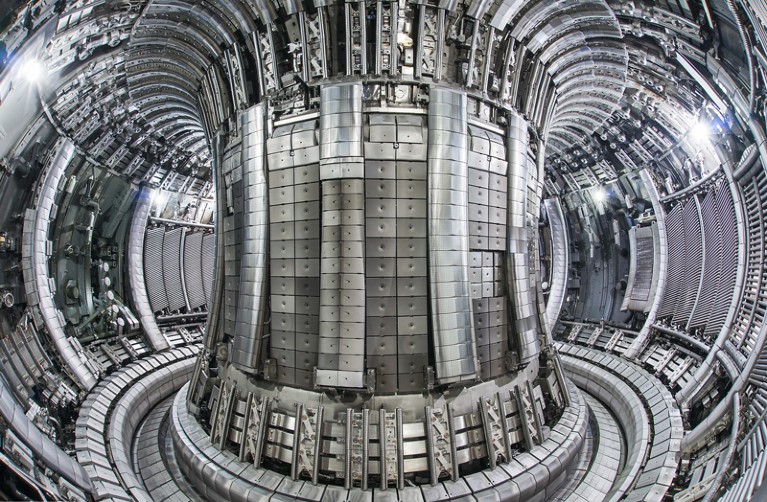
Fusion research in the United Kingdom faces an uncertain future after Brexit.Credit: EUROfusion
Prime Minister Theresa May conceded on 21 May that a post-Brexit Britain was willing to pay to “fully associate” with Euratom, Europe’s nuclear agency. The details of the arrangement, similar to many that surround the controversial exit of the United Kingdom from the European Union, still have to be ironed out. And among those watching the negotiations with mounting concern are scientists at the Joint European Torus (JET) near Oxford, UK, who currently benefit greatly from Britain’s membership of the agency. The hundreds of researchers at JET receive annual funding of around €60 million (US$70 million), because Britain is part of Euratom. As it stands, that funding will cease at the end of this year.
The JET facility serves as a key testing ground for ITER, the ambitious experimental fusion reactor being constructed in southern France. For the past three years, JET has been preparing a test run using a mixture of two hydrogen isotopes, deuterium and tritium, to mimic ITER’s planned eventual fuel mix. The test should give the best indication yet of the likely performance of ITER’s particular fusion method — which uses magnetic fields to confine a burning, ionized gas (or plasma) within a doughnut-shaped ring. The run should also help to guide the design of a prototype power plant to follow ITER.
The JET experiment is clearly a crucial project that needs support. But with Brexit looming, where will that support come from?
In theory, the EU can keep paying for JET in the short term. A progress report on the Brexit negotiations, published late last year, says the United Kingdom can continue to pay into and participate in EU funding programmes until December 2020. And Britain has confirmed that it will keep paying its (much smaller) direct share of JET costs until then, too. Moreover, the European Commission (EC) has said that the EU should continue to fund JET; cash for the lab is thought to be included in the EC’s draft programme of fusion-research funding in 2019–20.
But there is a snag. Before the EU can publicly confirm any plans to extend JET’s contract, a number of legislative hoops need to be jumped through. And the process is dragging. The problem lies in how fusion research is funded. A quirk of history means that Euratom’s research funding is allocated in 5-year periods — the current one ending in December 2018 — followed by 2-year top-ups that align the programme with the EU’s 7-year research-funding cycles (the latest of which ends in 2020). Although the top-up is a routine process, it requires the EU Council to approve new legislation, and that has yet to happen.
Renewal of JET’s contract has gone down to the wire before, but the added uncertainty of Brexit is making staff nervous. It hardly helps that the site is repeatedly highlighted in the UK press as a potential casualty of Brexit, rarely with the caveat that its contract should be secure until the end of 2020. JET’s chief executive, Ian Chapman, told Nature last year that some top-level staff had already found positions elsewhere. The longer the process drags on, the less attractive JET will seem to researchers.
One wrinkle has already been ironed out: draft text of the EU legislation has been tweaked to allow its fusion programme to include JET, even if the facility sits outside existing funding schemes. But a vote on the proposed regulation has been delayed by a decision to consult the European Parliament — largely a courtesy that has nothing to do with JET. And because the parliament is unlikely to offer an opinion until September, the final sign-off might now not come until December. No legislation means no research programme, which means no JET contract. The result is that staff at the facility might not officially know whether they have a job on 1 January 2019 until just days before — let alone be able to do the important deuterium–tritium run.
The facility itself is ploughing ahead with its preparations for the run, under the assumption that it will be funded for the next two years. It has no choice but to do so. The planned experiments are key to understanding how plasma will behave in reality, and nowhere else in the world can do the research before ITER is due to begin. Things will probably work out. But the prime minister’s concession regarding Euratom is yet another example of how much her government seems to be making up its Brexit policy as it goes along. Hoping that things will work out is no way to reassure anyone, let alone a basis for strategy. Politicians should act to secure JET’s funding for the next two years — and beyond.

 Europe pauses funding for €500 million fusion research reactor
Europe pauses funding for €500 million fusion research reactor
 How Brexit is changing the lives of eight researchers
How Brexit is changing the lives of eight researchers

